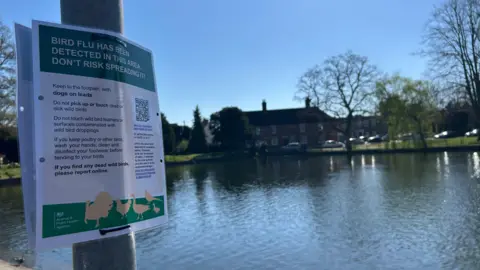Warning as bird flu found in dead gull
 BBC
BBCA warning has been issued after a confirmed case of bird flu was found in a wild herring gull.
Devizes Town Council has urged dog owners to take care after the bird was found dead in the town with H5N1 Avian Influenza as part of ongoing surveillance work.
In a post on social media a spokesperson for the local authority confirmed Wiltshire Council had been notified of the finding by the Animal and Plant Health Agency (APHA).
The public have been told to avoid touching dead or sick wild birds, their feathers, or surfaces contaminated by bird droppings.
 Getty Images
Getty ImagesDog owners should keep their pets on leads and use footpaths, the APHA said, with people who keep poultry or other birds advised to wash their hands and disinfect footwear after handling.
The Health Security Agency has said the risk to public health is very low.
A spokesperson for Devizes Town Council said: "We will continue to monitor the situation and keep the public informed of any developments."
What is bird flu?
Bird flu is a disease caused by a virus that infects birds, with other animals such as foxes, seals and otters also sometimes affected.
The major strain - circulating among wild birds worldwide - is a type of the virus known as H5N1.
Bird migration has led to outbreaks in domestic and wild birds and has, in extremely rare cases, infected humans.
Scientists say the current risk to humans is low. Transmission from birds to humans is rare and there has been no sustained human-to-human transmission.
